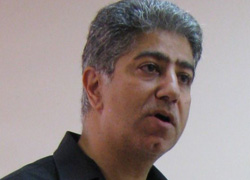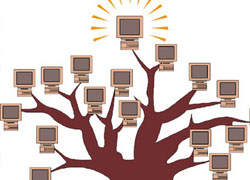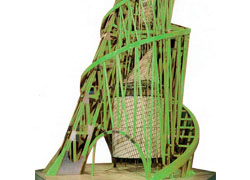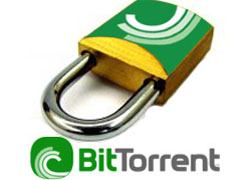IMDEA Networks

Event Category: In-house Presentation
Towards a Collision-Free WLAN: Dynamic Parameter Adjustment in CSMA/E2CA
Carrier Sense Multiple Access with Enhanced Collision Avoidance (CSMA/ECA) is a distributed MAC protocol that allows collision-free access to the medium in WLAN. The only difference between CSMA/ECA and the well-known CSMA/CA is that the former uses a deterministic backoff after successful transmissions. Collision-free operation is reached after a transient state during which some collisions may occur. This article shows that the duration of the transient state can be shortened by appropriately setting the contention parameters. Standard absorbing Markov Chain theory is used to describe the behaviour of the system in the transient state and to predict the expected number of slots to reach the collision-free operation.
Seguir leyendo arrow_right_altFrom Science to Business
The seminar will cover essential aspects of tech-based entrepreneurship, with special regard to ventures in the field of ICTs.
Resources for entrepreneurs at UC3M within the Campus del Emprendedor UC3M Programme will be detailed. An inspiring speech by young entrepreneurs from our Business Incubator will stimulate a discussion with attendees.
Seguir leyendo arrow_right_altNetworking and Network Security: Where I am, Where I am going?
In this talk I will briefly overview the research topics I have been working on, as well as describe new topics I recently began looking into. The former includes behavior-based Internet worm detection, Internet routing forensics, IP spoofing prevention, and trusted and incentivized peer-to-peer data sharing between distrusted and selfish clients. The latter includes reliable IP prefix monitoring, active phishing disruption, social networks for access control, security and privacy for homecare rehabilitation environments, and the clean-slate architecture design for future Internet.
The purpose of this talk is to provide a glimpse of my fights, so you can weigh which fights you would like to join me to win, or leverage my weapons to help win yours, or even better, we find and beat a common enemy.
Seguir leyendo arrow_right_altDynamic Control Channel Assignment in Opportunistic Cognitive Radio Networks
Cognitive radio networks (CRNs) involve extensive exchange of control messages, which are used to coordinate critical network functions such as distributed spectrum sensing, medium access, and routing, to name a few. Typically, control messages are broadcasted on a pre-assigned common control channel (e.g., a separate frequency band, a given time slot, or a spreading sequence). Such a static channel allocation policy is contrary to the opportunistic access paradigm. In this work, we address the problem of dynamically assigning the control channel in CRNs according to spatiotemporally varying spectrum opportunities. We propose a cluster-based architecture that allocates different control channels to various clusters in the network. The clustering problem is formulated as a bipartite graph problem, for which we develop a class of algorithms that provide different tradeoffs between two conflicting factors: number of common channels in a cluster and the cluster size. Clusters are guaranteed to have a desirable number of common channels for control, which facilitates graceful channel migration when primary-radio activity is detected, without the need for frequent re-clustering. We use simulations to verify the agility of our algorithms in adapting to variations in spectrum availability.
Seguir leyendo arrow_right_altPath ASSEMBLER: A BGP-Compatible Multipath Inter-domain Routing Protocol
The amount of redundant paths among ASes has dramatically increased throughout the Internet. Unfortunately, the unipath nature of BGP constrains border routers to course traffic across a single path at a time. Although, multipath inter- domain routing is able to provide richer routing configurations, the lack of incentives to replace BGP as inter-domain routing protocol implies that multipath solutions must be backwards compatible with BGP.
Seguir leyendo arrow_right_altEnergy-efficient fair channel access for IEEE 802.11 WLANs
Abstract-Greening the communication protocols is nowadays recognized as a primary design goal of future global network infrastructures. The objective function for optimization is the amount of information transmitted per unit of energy, replacing the amount of information transmitted per unit of time (i.e., throughput). In this paper we investigate the case of IEEE 802.11- based WLANs and first show that, given the existing diversity of power consumption figures among mobile devices, performing a fair allocation of resources among devices is challenging. We then propose a criterion to objectively balance between the most energy-efficient configuration (where all resources are given to the single most energy efficient device) and the throughput-optimal allocation (where all devices evenly share the resources regardless of their power consumption).
Seguir leyendo arrow_right_altPerformance evaluation of a Tree-Based Routing and Address Autoconfiguration for Vehicle-to-Internet Communications
Vehicular ad hoc networks have proven to be quite useful for broadcast alike communications between nearby cars, but can also be used to provide Internet connectivity from vehicles. In order to do so, vehicle-to-Internet routing and IP address autoconfiguration are two critical pieces. TREBOL is a tree-based and configurable protocol which benefits from the inherent tree-shaped nature of vehicle to Internet traffic to reduce the signaling overhead while dealing efficiently with the vehicular dynamics.
Seguir leyendo arrow_right_altUnrevealing the structure of live BitTorrent Swarms: methodology and analysis
BitTorrent is one of the most popular application in the current Internet. However, we still have little knowledge about the topology of real BitTorrent swarms and how the traffic is actually exchanged among peers. This paper addresses fundamental questions regarding the topology of live BitTorrent swarms. For this purpose we have collected the evolution of the graph topology of 250 real torrents from its birth during a period of 15 days. Using this dataset we first demonstrate that real BitTorrent swarms are neither random graphs nor small world networks.
Seguir leyendo arrow_right_altFakeDetector: A measurement-based tool to get rid out of fake content in your BitTorrent Downloads
Fake content represents an important portion of those files shared in BitTorrent. In this paper we conduct a large scale measurement study in order to analyse the fake content publishing phenomenon in the BitTorrent Ecosystem. Our results reveal that a few tens of users are responsible for 90% of the fake content. Furthermore, more than 99% of the analysed fake files are linked to either malware or scam websites. This creates a serious thread for the BitTorrent ecosystem. To address this issue, we present a new detection tool named FakeDetector that may prevent the download of almost 10 millions of fake files per year based on our evaluation. This could help to reduce the number of computer infections and scams suffered by BitTorrent users.
Seguir leyendo arrow_right_altWhere are my followers? Understanding the Locality Effect in Twitter
Twitter is one of the most used applications in the current Internet with more than 200M accounts created so far. As other large-scale systems Twitter can obtain benefit by exploiting the Locality effect existing among its users. In this paper we perform the first comprehensive study of the Locality effect of Twitter. For this purpose we have collected the geographical location of around 1M Twitter users and 16M of their followers. Our results demonstrate that language and cultural characteristics determine the level of Locality expected for different countries.
Seguir leyendo arrow_right_alt











Comentarios recientes